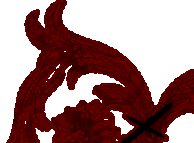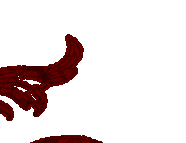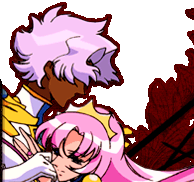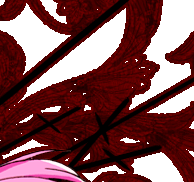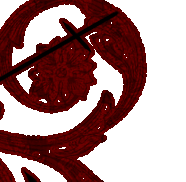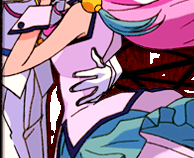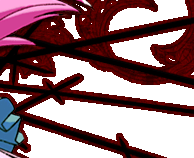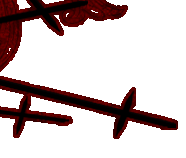
This analysis
was donated by Rhyaniwyn. 
Note: The names of the characters are stated in Japanese fashion, the last name first. My primary resource for the story is from the TV show, though there are references to the other versions. I am attempting to identify the most important parts of Utena's quest using Joseph Campbell's version of the monomyth.
Preface: Shoujo Kakumei Utena is a Japanese animation television series that caught my attention some years ago. The story consists of a 39-episode TV series, a feature-length movie, and 2 separate manga (graphic novels). The manga was written and drawn by Chiho Saito while the series and movie were directed by Kunihiko Ikuhara. The story is sprawling and complex, with rich symbolism and references to psychologists Freud and Jung as well as to the German writer Hermann Hesse.
"Once upon a time, there was a princess who was very sad, for her mother and father had died. Before this princess appeared a travelling prince on a white horse. His appearance gallant and his smile gentle, the prince enveloped the princess in the scent of roses and said:
'Little one, bearing up alone in such deep sorrow, lose not thy strength or nobility, even when thou growest up. As a token of this day, take this.'
'Pray, will I meet you again?'
'This ring should guide thee to me.'
Was the ring the prince gave her an engagement ring? That was all good, but the princess was so impressed by the prince that she decided to become a prince herself! But was that such a good idea?"
Tenjou Utena, a 14-year-old girl, remembers being comforted in her childhood grief by a prince on a white horse. His image, and the physical proof of the ring he gave her, lead Utena to believe entirely in his existence; while the memory of his words inspires Utena to become a prince like him. Utena does not clearly remember that defining event in her life, but she has
followed the cloudy image of her prince to Ohtori Academy, an elite private school with a bizarrely wealthy campus.
Ohtori Academy's student body is governed by a Student Council made up of four members. Each of these members is idolized by the student body, and it is said that anyone who displeases a Student Council member will disappear from the school. The Student Council President is Kiryuu Touga, a wealthy "playboy" who is called the "prince" of the Student Council. Vice President Saionji Kyouichi, captain of the Kendo team (a Japanese style of swordplay utilizing wooden swords), is Touga's "best friend." Member Arisugawa Juri is captain of the fencing team and is close to no one, but the underclassmen say that even a teacher will leave the school if Juri looks at him the wrong way. The shy Secretary Kaoru Miki is a genius with both his scholarly studies and the piano.
Although she does not know it, Utena's quest is more complex than her simple desire to both "become a strong and noble prince who saves princesses" and meet her prince again. This is not obvious to either the viewer or to Utena at first--but the series becomes progressively more complicated (as does Utena's life). Utena is foolishly sure of her ideals, however, and this naivete spurs events to the bitter end. If only the world she lived in were an ideal one, her quest could have ended with a prince and a princess riding off into the sunset.
How Utena came to Ohtori is unclear in the animated series, though in the manga (graphic novel) she receives a puzzle in the form of mysterious letters that point her to the Academy. Utena is immediately popular with the other students, and her closest friend at Ohtori is the lively Wakaba. Wakaba has a crush on the brooding Saionji, Student Council Vice President.
One day, while looking out a window, Utena observes Saionji slapping impassive Himemiya Anthy (A girl the entire school regards as "strange"). Utena is shocked and disgusted by Saionji's action and is relieved to see Student Council President Touga intervene. She is immediately distracted by Wakaba, and the two begin to walk around the campus. They soon come across a gaggle of students reading a love letter tacked on a bulletin board. The love letter is from Wakaba to Saionji, and Wakaba is humiliated. Impulsive and gallant, Utena goes to the Kendo room to find Saionji. Utena berates him for his insensitive action, defending her friend, but Saionji responds with coldness and cruelty. Utena grabs a wooden sword out of a bin and challenges Saionji to a duel.
What Utena does not know is that dueling at Ohtori Academy is a ritual practiced only by the Student Council or others who wear a symbol called the "Rose Signet Ring." These rings are "coincidentally" identical to the ring Utena's prince gave her; therefore she is allowed to duel. The Student Council members were given their rings by a mysterious person known to them only as "Ends of the World," who regularly sends them letters that direct the duels. Utena is told to meet Saionji in the "Dueling Arena," which he tells her she will find in the forest behind the school (the one that no one is allowed into, of course). The Rose Signet Ring allows Utena access into the Arena as if it is a key, and she ascends a long spiraling staircase to find both Saionji and, to her surprise, Anthy. Above the Arena is a mysterious and awe-inspiring sight: a castle floating upside-down in the air. The castle cannot be seen from outside the Arena.
Next, Utena witnesses another act of brutality from Saionji, who again strikes Anthy. Her first duel cannot begin before Saionji gets his sword.
The sword, called the "Sword of Dios," is drawn from Anthy's chest.
Anthy explains to Utena, as she places roses in the breast pockets of the duelists' coats, that whomever loses their rose first will lose the duel. As the pair begin to fight, Utena's ignorance of matters becomes obvious; Utena came to the duel only with a hollow wooden sword of the type used in Kendo. The Kendo sword is quickly reduced to splinters. A lesser individual would have given up, but Utena remembers her prince's words about strength and nobility and rushes Saionji with the hilt and splintered remains of her sword. She wins.
These events were Utena's "Call to Adventure." The "Call to Adventure" is the first part of a hero's journey (as documented by Joseph Campbell in 'The Hero with a Thousand Faces'). Often by chance or accident, the hero finds him/herself in a world of which he/she never previously suspected. By virtue of her friendship with Wakaba, Utena has started down the path of a strange adventure. Aptly, Utena's first duel is called "Amitie," or "Friendship."
The second part of a hero's journey is the "Refusal of the Call." Many heroes refuse to acknowledge the call and their adventures are turned into highly negative experiences. Utena's second duel, "Choix" or "Choice," gives her the chance to back out. Saionji challenges her to a rematch. In the interim, Utena has learned that, as the new champion duelist (the Victor), she is given possession of a trophy. That trophy is the Rose Bride, known to most as Himemiya Anthy. Anthy claims that she has no will of her own and will follow the dictates of the Victor. Now that Utena is the Victor, Anthy is "engaged" to Utena and as Utena's "engaged bride" she will do whatever Utena wishes. Anthy tells Utena that all of the duelists will come to challenge Utena in order to possess the Rose Bride. So when Saionji challenges her, Utena resolves to purposely lose so that she does not have to be caught up in such ridiculous matters. However, at the critical moment in the next duel, Utena finds that she cannot purposely lose. This new resolution triggers something strange: an ephemeral figure bearing a striking resemblance to the prince of Utena's memory enters Utena's body and grants her abilities beyond her normal capacities for a few short moments.
Dios, Utena's prince, is the figure who grants Utena "Supernatural Aid." A hero who decides not to refuse the "Call to Adventure," will meet a figure who will offer him or her mystical aid of some sort or advice to help the hero in his/her journey. Dios not only gave Utena the ring which allows her into the Arena, but also warned her not to lose her nobility. Dios' powers manifest often to aid Utena throughout her adventure.
Utena has, at this point, has already crossed the "First Threshold." This threshold is probably best characterized by the gate to the Dueling Arena, which Utena could only pass by virtue of the ring Dios gave her. The "First Threshold" is often guarded by a juxtaposition of forces. The form of the forces of good, innocence, and nobility manifest in Dios. Dios' opposite is the man known as "Ends of the World," the same man who provided the Student Council members with their rings. Utena is now heading down the "Road of Trials," which is a portion of a hero's journey in which the hero finds him/herself in a dream landscape characterized by "curiously fluid, ambiguous forms" and "where he/she must survive a succession of trials (Campbell 97)."
The next 5 duels Utena fights are all named. The third duel "Raison" or "Reason" is fought against Miki, the Student Council Secretary. Miki is distracted by Anthy's uncharacteristic shouting, which aids Utena in winning. Utena fights the Student Council member Juri in the fourth
duel, "Amour" or "Love." Juri, a far better swordswoman unswayed by Utena's idealism, dares Utena to win by using a miracle. When it seems Utena has all but lost, Utena's sword, which had been knocked away, comes flying down to precisely chop Juri's rose off her chest. In the duel "Adoration" Utena fights Touga's (the Student Council President) younger sister, Nanami. Nanami attacks Utena with a dagger even after Nanami has lost, yet Utena still treats Nanami with compassion, showing Utena's noble character.
The next two duels demonstrate how Utena's naivete, which contributes to her overwhelming "nobility," can also be Utena's downfall. Touga, the Student Council President, has been cultivating Utena. He has been systematically lowering her defenses against him, chipping away at her distrust of him, cleverly making Utena think that he could be the prince she met as a child.
In the sixth duel, "Conviction," Utena loses to Touga because she is convinced that he is her prince and will not truly fight him.
After the duel of Conviction, Utena completely loses her identity. Touga proves to Utena that Anthy will only parrot what he has told Anthy to say now that he is engaged to her. Utena can't believe that Anthy is truly the obedient Rose Bride and not a normal, albeit repressed, girl. Utena had made it her goal to keep Anthy out of the other duelists' hands because Utena believed they could not understand Anthy's true desire to be free of the duels. Of course, Anthy was probably only saying that because it was what Utena wanted to hear. Anthy's words as Touga wanted them said seemed to prove it, "I'm happy being the Rose Bride. I like being alone." In the next episode, Utena is wearing a girl's uniform, instead of her signature outfit, an altered boy's uniform, and Utena is not acting like herself. Only Utena's friend Wakaba manages to bring Utena out of her depression. "It's like something was stolen from you, and it's made you a coward," said Wakaba, "I don't know what, but whatever it is, get it back!" In her mind's eye, Utena sees Anthy and tells Wakaba that she will go "take back [her]self."
In the seventh duel, called "Soi" or "Self," Utena challenges Touga to a rematch. Touga knows far more about the mystical mechanics of the duels than any of the other duelists. He has Anthy kiss the Sword of Dios and commands her to "abandon her body and protect the sword" which makes sword red-hot and powerful. With a sword Juri has loaned to her, Utena, in girl's uniform, fights to take herself back even if, she says, she still doesn't understand anything about the duels, including Anthy. What Utena had to take back was not merely Anthy, it was the quest that defines Utena's identity. Anthy has become the princess Prince Utena wants to save. How could a hero be a hero without a quest? But what does Anthy need to be saved from?
The next 12 duels are not named, but Utena fights a number of new duelists who draw their swords from the chests of the old duelists. They are manipulated into this through the machinations of "End of the World." The swords taken from the old duellists are supposed to infuse the new ones with the abilities of the person they are drawn from. These duels are merely building up Utena's strength and conviction for her last duel. During these duels Anthy begins drawing the Sword of Dios from Utena's chest, perhaps to grant it Utena's spirit. The stage is being set for the final duel: Revolution. It is said that whoever is engaged to the Rose Bride will be given the "power to revolutionize the world." This power is called the power of inspiration, of miracles, and of eternity.
By this time, a new character named Akio--Dios' opposite--has been introduced. Akio's is Anthy's beloved older brother, also the Chairman of the Board and Dean of Ohtori Academy, with whom Anthy spends every evening. It is slowly revealed that Akio is "Ends of the World," and that Anthy's relationship with her brother is, to say the least, unnatural. Furthermore, there is something uncanny about the pair.
Utena's innocent illusions about the world around her are systematically stripped away--all masterminded by Akio. Akio manipulates Utena into falling in love with him and Utena loses her virginity to Akio, although she knows that Akio is already engaged to another woman. She then discovers the secret relationship between Anthy and Akio and is horrified. And although Utena has seen so much evidence that Anthy is not the kind, but misguided girl Utena believes she is, Utena goes to fight the duel of Revolution. Utena still aspires to be a pure and noble prince, Anthy's prince.
However, Akio was a prince. He was, in fact, the same prince Utena met as a child. Apparently, the world was once a place of light and all girls were princesses protected by a great prince, Dios. There is a story that one day Dios was tricked by an evil witch. The witch desired to take Dios from the other girls and keep him for herself. Anthy was that witch. However, Anthy's act is also shown as one of sacrifice for a brother she loved. Dios collapsed in exhaustion from the work of protecting and saving all the girls in the world. Anthy, to protect him, told the people demanding that Dios come out that she would keep him for herself. She then stabbed by the people of the world for her dual sins--loving as a prince a man who was her brother and taking the prince away from the world. As the prince's sister, Anthy was the one girl Dios could not, and did not, save. At the moment Dios came outside and saw what had been done to his sister, he ceased being a prince. The Dios seen helping Utena is nothing but a remnant of the dead prince while Akio is what Dios has become. But Akio wants the power of Dios back and the duels are the way he plans to accomplish that.
In the duel of Revolution, Utena must fight the "Ends of the World." When Akio appears, Utena is not surprised to see him, although nothing has overtly prepared her for the fact that Akio is also the "Ends of the World." Akio draws the Sword of Dios from Utena's chest, telling her that girls cannot be princes, but that Utena can be his noble princess and live with him in the castle forever. Utena's uniform changes into a dress almost identical to Anthy's Rose Bride dress. After listening to Akio's persuasions, Utena asks him what will happen to Anthy if she agrees. Akio replies that Anthy is the Rose Bride and will always be the Rose Bride because Anthy chose to be so. Utena grabs the sword from Akio, saying she cannot do what he asks--she must rescue Anthy. Then, Akio exposes the Dueling Arena for what it is: the planetarium in his office. The Arena, the castle, and the strange things that happened there were all images
created by a projector "that paints the illusion of fairy tales for those with naïve wishes in their hearts." Akio explains that Utena is too young to understand the value of the room, which he calls the highest point of the earth—the "End of the World." The castle in the sky and Utena's dream of becoming a prince are fairy tales, illusions.
Akio states that the duel of Revolution is no game (all the previous duels have been part of his game), not understanding that, to Utena, becoming a prince is not a game. They begin to fight and Utena is clearly winning until Akio pushes Anthy in the way. Utena moves Anthy to shelter behind her back, then Anthy seemingly conjurs a sword, and stabs Utena in the back. Utena falls to the ground, gasping, "Himemiya...why?" Anthy replies that Utena is what Dios used to be when Anthy loved him--but that Utena must fail because she is a girl and a girl cannot be a prince. Then Anthy takes the sword from Utena's limp hand and gives it to Akio saying, "you are he who chose this road, knowing the whole of the world." Suddenly, millions of swords appear in the sky and pinion Anthy as a grusome sacrifice in the air. Utena looks up to see Anthy being repeatedly stabbed by the swords and begs Akio to help Anthy, to save Anthy. But Akio is busy using Utena's sword to try break down the doors that supposedly seal away the power he wants. The sword drawn from Utena's body seems to be a part of her, because each time Akio strikes the doors, Utena's body heaves in pain.
As the world fades around Utena, Dios appears to comfort her. He tells
her that she did well to come as far as she did, but that no girl could break down the doors. If Utena could get beyond them to the alleged power, he says, she could do anything--including freeing Anthy from her "fate". "This kiss is your consolation," Dios soothes her as he bends to kiss Utena's ring. The world comes into focus again as Utena slams her fist into the ground and laborously pushes herself up. She begins to stumble toward the doorway, where Akio has broken the sword, and has not opened the doors. Akio is surprised to see Utena struggling toward the doors and catches her as she falls, exclaiming "Don't tell me you are going to try to open the doors? The Sword of the Prince is broken. You can't open the doors." Utena shoves him away and falls to roughly the ground, but rises again and continues toward the seal that locks away the power of Dios.
Akio and Dios sit and indifferently watch Utena as she struggles to pry the doors open with her bare hands. Utena starts to cry as she says, "Himemiya...you don't know...how happy I was just being with you." Her tear falls and triggers something--and the doors are suddenly open. Inside there is no shining ball of power. There is a coffin--which Utena strains to pry open. Akio yells, obviously terrified, not to open that coffin; that Utena doesn't know what she's doing. But Utena doesn't stop and manages to shift the lid just a little. Inside is Anthy, the "real" Anthy, and not the soulless Rose Bride. The swords above the Arena explode outward and Anthy's body is no longer at their center. Deprived of their sacrifice, the swords begin to circle as if they are looking for a new victim. Utena calls to Anthy through the crack in the coffin and Anthy responds. "At last I've met you..." Utena says.
This pinnacle of Utena's journey is called "The Meeting with the Goddess." Some heroes' ultimate adventure involves meeting the supreme goddess of the world and marrying her, either symbolically or sexually. No one else in the story ever strived to help and understand Anthy the way Utena did. No one else seemed to know that Anthy had locked herself away, put her heart in a sealed coffin where no one could touch it. Utena seems to be blinded to reality by her nobility, but in the end that was an asset. Utena was the only one who cared for Anthy enough to want to free her. Joseph Campbell expouses about the Goddess: "By deficient eyes she is reduced to
inferior states; by the evil eye of ignorance she is spellbound to banality and ugliness. But she is redeemed by the eyes of understanding. The hero who can take her as she is, without undue commotion but with the kindness and assurance she requires, is potentially the king, the incarnate god, of her created world." The one who would fight for Anthy's freedom until the end would become the prince, Dios, god. Whoever Anthy loves will become a true prince.
Utena persuades Anthy to take her hand as the Arena is crumbling around them. Their fingertips touch and Utena smiles at Anthy before the section of the Arena that Anthy's coffin rests on teeters, falls, and their hands slip apart. Utena is left hanging over the broken edge lamenting, "I guess I couldn't become a prince after all. I'm sorry, Himemiya, for only being a prince of make-believe." The swords race toward Utena, tearing apart the Arena, and possibly Utena herself. In the end, Utena believes that she has failed to free Anthy and to become a prince.
But Anthy has, in fact, been saved by Utena's actions. Back on the seemingly unchanged school grounds, Akio tells Anthy that he will need her help starting the duels over from scratch. He still wants that power. Anthy says quietly, "You don't even know what happened, do you? That's all right. You just go on playing make-believe prince in this coffin forever. I have to go." Then Anthy changes into "real" clothes (clothes other than her school uniform or Rose Bride dress), takes off the glasses she wore but didn't need, and lets down her always tightly-bound hair. She stands at the gate of Ohtori Academy with a bag and exclaims, "This time, I will come to you. Where ever you are, I will surely find you. Wait for me, Utena!"
The final stage of the hero's journey is complete. The hero's return to the world can be accomplished (or not) in many ways. Utena's "return" is called "Rescue from Without/Resurrection." Sometimes, the hero can't return on her own and the world has to come to rescue the hero. However, there is another obvious interpretation. Ohtori has been exposed as a world of illusion, and there is a real world awaiting the ressurected hero--as Anthy says, "That person isn't gone. She merely got out of your world."
Afterword: I highly recommend to anyone interested in over-analyzing Utena: read about the monomyth. There are various other archetypes that can easily be applied to the story and open up fascinating interpretations. But my essay was long enough as it was, and, as this was a paper I turned in for English class, confusing enough for someone who wasn't a fan.
 |

